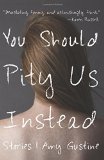Summary | Excerpt | Reading Guide | Reviews | Beyond the Book | Readalikes | Genres & Themes | Author Bio

 Book Reviewed by:
Book Reviewed by:
Rory L. Aronsky
Buy This Book
Then one Friday afternoon she is forced to venture into the street because her cousin's daughter has had a baby and there is a party. No protesters are about, but she dons a disguise anyway—old glasses, a hat, her nurse's uniform—to walk the ten blocks to her cousin's house. When she arrives, an aunt on the baby's father's side, a woman she has never met before, shakes her head sympathetically and says she heard what they are saying about R. "Don't worry," the woman assures her. "We all know it isn't true. It is impossible for a Jew to become a Muslim. Muslims are dogs." She lights a cigarette and puffs. "Putting a collar on a human doesn't make him a mutt."
The other women in the room blanch, casting silent apologies to R's mother, who returns their pained expression with a neutral stare, as if she doesn't know what the problem is.
As a distraction, someone asks the new mother how her labor was. Long, she says, and lots of back pain. This sparks a round of birth stories. The new mother's trials are trumped first by a mother allergic to pain medication who delivered a ten-pound girl, then by one who gave birth in the hospital's waiting room. Finally, a tiny woman tells of delivering twins on a moving bus. She wins, yet the stories continue—strange places, strange pains, rude medical staff. R's mother remains silent. Her birth story can't be told.
On the way home, she passes a café she used to like and glances in the window, thinking of their pastries. There, on a TV monitor hanging from the wall, is her son, his features digitally removed from the structure of his face and superimposed on a missile embossed with the star and crescent. Grabbing the door from a young couple stepping out, she goes inside. One of the pundits, a chubby man with a bad comb-over, is saying it doesn't matter whether R has converted to Islam or not. "He was born a Jew, so he is a Jew. We must get him out."
R's mother thinks of the blood-lettered banner, the old woman at the party. What would they say if they knew the truth? It's only a matter of time before a journalist goes digging—before the truth creates lies, and lies become facts.
At home she packs quickly, a change of clothes, a few toiletries. Then she gathers pictures of R. Recent ones, in which he's recognizable—one on his fifteenth birthday with his favorite red shirt, one at the beach, one from high school graduation—but also older ones, to show him at his most vulnerable. On his seventh birthday with both front teeth missing. On the day he took his first step, his hands flung in the air, his expression shocked and joyful. Finally she takes the first picture of all in which he isn't even visible. Only she can be seen, standing outside an airplane bound for home, holding something wrapped in a yellow blanket.
She leaves behind the picture of R in his IDF uniform, his long-toothed smile hidden in an ambivalent twist of the lip, his eyes lost in the shadow of an Israeli flag unfurled at the edge of the frame.
As her plane descends into Cairo's International Airport, R's mother looks down on the glittering high-rises lining the Nile's shore, then inland, to the raw-concrete worker's homes, squatting in twilight. To the east is the City of the Dead, crumbling, necropolitan mustards, and to the west the dark, ancient deserts of Giza's tombs, so singular and grand they strike her not as burial plots, but as alien settlements. Everywhere there are minarets, looking from above like missiles. As they near the earth, a few small crosses appear, then smokestacks, antennas, and satellite dishes, then finally bags and bags of garbage held in check by brick walls.
Her plane lands, opening to air that smells like home, hot and dusty. She wears black to blend in with the married women. The customs official examines her blue passport closely, but it doesn't arouse suspicions. Her last name is common in Israel, one of the favorites for immigrants looking to shed their European identities.
Excerpted from You Should Pity Us Instead by Amy Gustine. Copyright © 2016 by Amy Gustine. Excerpted by permission of Sarabande Books. All rights reserved. No part of this excerpt may be reproduced or reprinted without permission in writing from the publisher.





The Funeral Cryer by Wenyan Lu
Debut novelist Wenyan Lu brings us this witty yet profound story about one woman's midlife reawakening in contemporary rural China.
Your guide toexceptional books
BookBrowse seeks out and recommends the best in contemporary fiction and nonfiction—books that not only engage and entertain but also deepen our understanding of ourselves and the world around us.